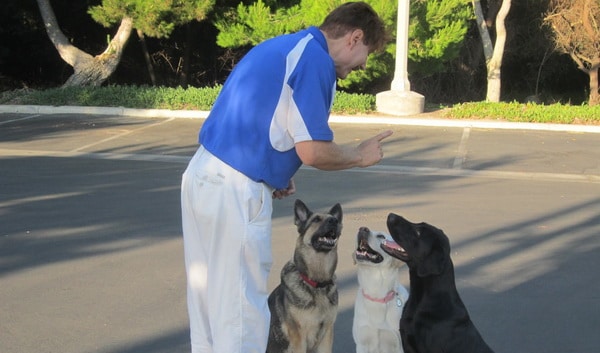According to Vladae Roytapel, the famous Russian Dog Wizard, there are at least 10 common mistakes that dog owners make:
1. Humanization – If you treat your dog as a human your dog will treat you as a dog. Your dog is not your child or you’re relative. The wolf is still your dog’s second cousin.
2. Democracy – Dogs and democracy don’t mix. There is no such thing as the Bill of Rights in the canine world. If you want your dog to become an acceptable member of the family, he must be last in the hierarchy of social order.

3. Allowing your dog to live on welfare – Dogs in the wild hunt for food and other resources. When they live in your home they still acquire a need to work for their food and possessions in order to be happy. Give your dog physical and mental exercise. Physical exercise can be simply playing a game of fetch. Mental exercise can be practicing proper obedience training for 10-15 minutes per day. These games and exercises will help make your dog tired. Remember, a tired dog is a good dog.
4. Afraid to say “no” – Don’t be afraid to say no to your dog and to set limits and enforce these limits with consequences. But remember, the human way of discipline will always create the opposite effect on the dog.
5. Speaking English to your dog – The only language your dog understands is dogglish. Examples of speaking dogglish are praising your dog in a high-pitched tone of voice. This means approval. Disciplining your dog in a low town of voice means disapproval.
6. Giving unconditional affection – Do dogs enjoy human affection? Yes, of course, they do. But dogs need not only human affection to become balanced and happy. In fact, many people are shocked to learn that dogs actually desire structure and discipline more than they desire human affection. Touch and affection are human needs and desires that we inflict upon our dogs. But our dogs look to us for signs of leadership and rules, not touch and affection. Please make sure to always balance love and discipline.
7. No demands for respect – Remember that no one will listen to you and give you respect out of gratitude. Do you think your dog is any different? No, dogs who obey an owner out of gratitude belong to Hollywood movies and do not exist in reality. Start demanding respect. There are three ways to achieve this:
• Never give a command which you cannot reinforce
• If you give a command follow through by all means necessary
• Don’t ever repeat a command.
8. Underserved privileges – If your dog is currently being rehabilitated or is displaying any kind of behavioral problem, you will want to stay away from allowing your dog these privileges:
• Sleeping with you in your bed and sharing the same furniture. This is giving your dog greater social status by physically raising himself above you or on the same level as you.
• Free feeding. Alpha always eats first. Make your dog wait for his food for one minute.
• Enter hallways and such before your dog does – alphas always go first.
9. Allow the dog to lead on walks and bark in your house – Pulling on the leash is not just an inconvenience. It’s a sign that your dog believes he is in charge of you. Did you know that allowing your dog to lead on a walk and bark in your house is giving your dog permission to growl and bite whomever he chooses? It’s true! By doing this, he is putting himself in a position of authority and putting you in a subordinate position. Pulling on the leash can also lead to damage to the neck and impaired vision. It’s okay if your dog barks one or two times when someone knocks on the door. But if the barking continues it can become a big problem. Dogs who constantly bark think they are in charge and they are the decision-makers.
10. Not allowing your dog to be a dog – dogs are very different from humans. Human psychology has no bearing on them. We love our dogs for a multitude of reasons but they can only love us back for one. When interacting with your dog you must use canine language and actions to establish authority, which will create harmony in your relationship as nature intended.
Especially for the Russian Dog website.
We use cookies to offer you a better browsing experience, analyze site traffic, personalize content and ads.